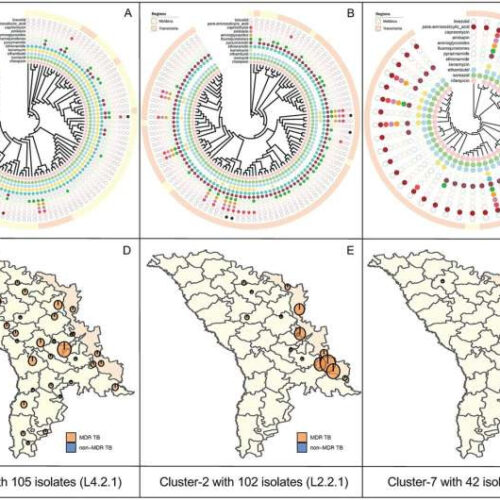by David Kaczorowski, The Conversation Credit: Pixabay/CC0 Public Domain Demand for life-saving organ transplantation is at an all-time high. In 2021, a record 41,000-plus organ transplants were performed in the U.S., with top numbers for kidney, liver and heart transplants. But a limited supply of donor organs remains an ongoing problem. Currently over 100,000 people are on the transplant...
Biosensors for quick assessment of cancer treatment
by Georgia Institute of Technology Sensing T cell killing of tumor cells by antibody–GzmB sensor conjugates. Credit: Nature Biomedical Engineering (2022). DOI: 10.1038/s41551-022-00852-y Immune checkpoint blockade (ICB) inhibitors have transformed the treatment of cancer and have become the frontline therapy for a broad range of malignancies. It’s because they work better than the previous standard of care....
Study identifies drug-resistant tuberculosis strains spreading in Moldova
by Matt Kristoffersen, Yale University (A–C) Tree visualizations for 3 large putative transmission clusters (N ≥ 10 isolates), each showing the location of cases in either the Moldova or Transnistria regions along with resistance/susceptibility to 12 anti-TB drugs, as identified by in silico prediction. (D, E) Spatial distribution of 3 largest clusters (Cluster 1, 2,...
Preventing long-term pain from shingles
Researchers from the University of Bristol are recruiting patients with newly diagnosed shingles into a new study, to see if they can prevent the long-term pain which commonly persists after the rash has healed. About one in three people get shingles, which causes a painful rash. People with shingles should be seen by their GP...
GSK’s shingles vaccine approved for younger immunocompromised patients
GSK Australia confirmed the availability of its shingles vaccine, Shingrix, as a private script for the prevention of shingles (herpes zoster) and post-herpetic neuralgia (PHN) in people aged 18 years and over who are at increased risk of shingles. Until now, GSK and MSD’s zoster vaccines have only been licensed in Australia for use in...
Clearance of Senescent Cells is a Promising Approach to the Treatment of Alzheimer’s Disease
Today’s open access review discusses the growing burden of cellular senescence with age in the context of brain tissue and neurodegenerative disease. Cells become senescent constantly throughout life, largely the result of ordinary somatic cells hitting the Hayflick limit on replication, but also, and increasingly with age, due to a stressful, damaging, inflammatory environment. Senescent cells serve a useful purpose when present...
Scientists make leap forward for genetic sequencing
In a paper published in Sciences Advances, researchers in the Department of Chemistry and the Department of Physics & Astronomy at the University of California, Irvine revealed new details about a key enzyme that makes DNA sequencing possible. The finding is a leap forward into the era of personalized medicine when doctors will be able to...
McMaster inventors’ repellent wrap shown to shed all viruses and bacteria
New research by the inventors of a promising pathogen-repellent wrap has confirmed that it sheds not only bacteria, as previously proven, but also viruses, boosting its potential usefulness for interrupting the transmission of infections. The new wrap, designed to protect against contamination on high-touch surfaces such as door handles and railings, is now moving toward...
Long-term Outcomes Among Patients With Advanced Kidney Disease Who Forgo Maintenance Dialysis
Susan P. Y. Wong, MD, MS; Tamara Rubenzik, MD; Leila Zelnick, PhD; et alSara N. Davison, MD; Diana Louden, MLib; Taryn Oestreich, MPH, MCHES; Ann L. Jennerich, MD, MS Author AffiliationsArticle Information JAMA Netw Open. 2022;5(3):e222255. doi: 10.1001/jamanetworkopen.2022.2255editorial comment icon Editorial Comment Key Points Question What are the long-term outcomes of patients with advanced kidney disease...
Spider silk can stabilise cancer-suppressing protein
KAROLINSKA INSTITUTET The p53 protein protects our cells from cancer and is an interesting target for cancer treatments. The problem is, however, that it breaks down rapidly in the cell. Researchers at Karolinska Institutet in Sweden have now found an unusual way of stabilising the protein and making it more potent. By adding a spider...



